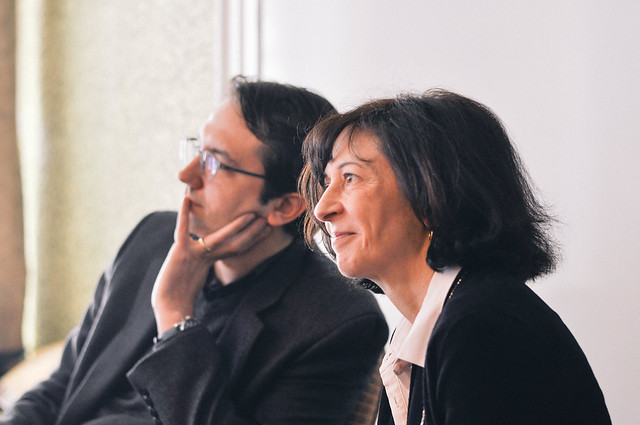Event Highlights: Eastern European Democracies and the EU Rule of Law Framework (Europe and Law Series)
On March 17, 2016, under the auspices of the new Jean Monnet Chair in European Law, and in collaboration with the Center for the Study of Europe, Prof. Daniela Caruso launched a Europe + Law lecture series. Vlad Perju, Director of the Clough Center for the Study of Constitutional Democracy at Boston College and a tenured Associate Professor at Boston College Law School, delivered the first lecture. Perju’s primary research and teaching interests include the law of the European Union, comparative constitutional law and theory, international and comparative law and jurisprudence.
The event began with Caruso’s introduction to the European Law Series, addressing the question of whether law can fix the challenges facing the European Union or whether it enabled such issues to develop. After each participant in the discussion introduced themselves, Caruso welcomed Perju, who stated his hope to challenge the way the audience thinks about the EU. Specifically, he explained that he planned to discuss the future of Poland given the recent developments in other Eastern European countries such as Romania and Hungary, as well as the question of potential EU influence on impending Polish transformations. Perju explained how there are many matters that EU institutions need to address, and that the varying dimensions and levels of policymaking in Europe determine the potential reaction and tools made available to resolve these issues. Additionally, Perju outlined what he referred to as the intellectual question facing Europe today, claiming, “European integration is the French Revolution of our time,” forcing citizens to comprehensively think about politics. He explained that everyone should have opinions on these social, economic, and political issues, and EU institutions should reflect these perspectives rather than exclusively those of politicians and intellects in looking toward the future of Europe.
Perju described how the pace of developments in Hungary in 2010 and Romania in the summer of 2012 demonstrated how European institutions were taken by surprise, and how they are currently facing similar fast paced changes in Poland, stating “almost as if time has run out of patience… there is an accelerated rhythm in Eastern European politics.” He continued by explaining how, even in 2007, discussions about the future of Poland recognized that the nation was at a crossroads, either heading in its own direction or continuing the pattern of Eastern European development seen in in other former Soviet states, as there are “similar dangers in post-Communist Europe.” Perju summarized a conversation between two intellectuals analyzing this question, highlighting their recommendation to watch the developments in Russia under Vladimir Putin in recent years, ominously concluding, “there are times when the wind favors what’s mean in us rather than what’s noble.”
Perju explained how the majority of his presentation would focus on Poland, given its contemporary developments, but that he would also analyze Hungary and Romania given the constant changes and profound transformations attempted in each of these states. He further explained how Romania acts as a case study for where EU influence was arguably significant in preventing certain events to unfold. Perju stated that he expects Poland to develop independently from Romania and Hungary depending on where things are for EU institutions. He continued by explaining that profound transformations driven by politicians have been a staple of life in Eastern Europe following the collapse of communism, returning the region to the political organization seen prior to WWI. He explained that a peculiar feature in many Eastern European nations is the “political evanescence”, which results in political parties vanishing after electoral cycles, but he added that in Poland and Hungary resilient anti-communist sentiments have led to more political structuring.
Perju described how citizens in Eastern Europe have been good at throwing out incumbents in regularly scheduled elections, limiting many political parties and leaders from returning to power. However, as Perju explained, from 2002-2010 in Poland, Hungary, and Romania, there were political parties returning to power leading to 8 years of continuity. Similar to problems seen in Western Europe, where many political parties remain in power for longer consecutive periods, these Eastern European states face the issues of building tensions within and between political parties, growing corruption, and severance of connections to their electorates.
Perju explained the challenge for EU institutions by stating, “the EU does not have rules about some unitary form of domestic constitutional regimes- so each country has its own way of arranging its political affairs.” He continued by describing how the varying forms of government have different disadvantages and advantages. Using the example of the Parliamentary system, Perju explained how the structure of a parliamentary government promotes citizen involvement given the limited checks and balances, leading to a quite responsive regime that gains political traction. Perju also explained the disadvantages of Parliamentary systems given the danger of political fragmentation resulting from the necessary formation of coalition governments. He continued by using the example of Hungary in 2010, when the political party returning to power obtained a 68% majority government and had the power to amend the constitution 12 times, pass 800 new laws, and eventually make a new constitution. Perju highlighted the question of pace, addressing how EU institutions were shocked by the rapid changes in the framework of the Hungarian law system.

